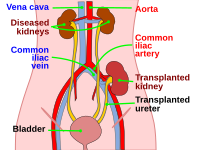
Photo from wikipedia
Static cold storage (SCS) and hypothermic machine perfusion (HMP) are two primary options for renal allograft preservation. Compared with SCS, HMP decreased the incidence of delayed graft function (DGF) and… Click to show full abstract
Static cold storage (SCS) and hypothermic machine perfusion (HMP) are two primary options for renal allograft preservation. Compared with SCS, HMP decreased the incidence of delayed graft function (DGF) and protected graft function. However, more evidence is still needed to prove the advantages of the HMP. In this study, the outcomes of kidney grafts from the two preservation methods were compared by conducting a systematic review and meta-analysis. Randomized controlled trials (RCTs) comparing the effect of hypothermic machine perfusion and static cold storage in deceased donor kidney transplantation were identified through searches of the MEDLINE, EMBASE, and Cochrane databases between January 1, 1980 and December 30, 2017. The primary endpoints were delayed graft function and graft survival. Secondary endpoints included primary non-function (PNF), graft renal function, duration of DGF, acute rejection, postoperative hospital stay and patient survival. Summary effects were calculated as risk ratio (RR) with 95% confidence interval (CI) or mean difference (MD) with 95% confidence intervals (CI). A total of 13 RCTs were included, including 2048 kidney transplant recipients. The results indicated that compared with SCS, HMP decreased the incidence of DGF (RR 0.78, 95% CI 0.69-0.87, P < 0.0001), and improved the graft survival at 3 years (RR 1.06, 95% CI 1.02-1.11, P = 0.009). There was no significant difference in other endpoints. HMP might be a more desirable method of preservation for kidney grafts. The long-term outcomes of kidney allografts stored by hypothermic machine perfusion still need to be further investigated.
Journal Title: Artificial organs
Year Published: 2019
Link to full text (if available)
Share on Social Media: Sign Up to like & get
recommendations!